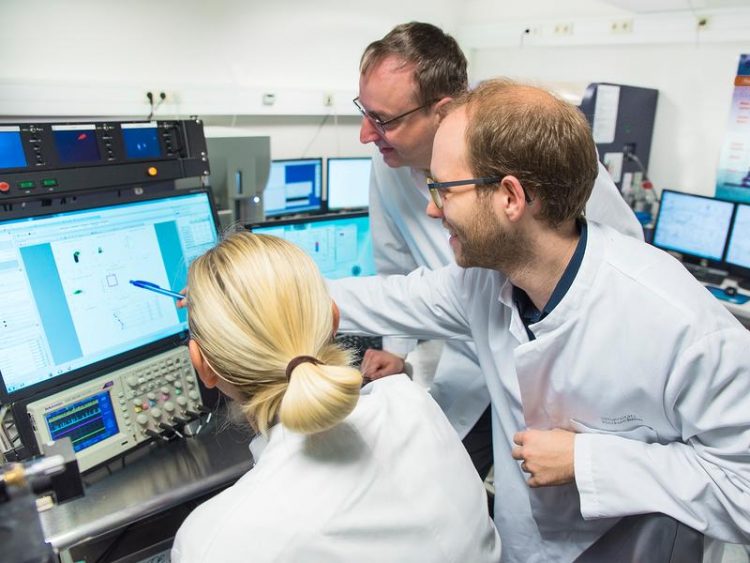Researchers release the brakes on the immune system

Dr. Janine Gotot, Prof. Christian Kurts and Christoph Heuser (from left) analyzing the immunological data. (c) Photo: Volker Lannert/Uni Bonn
Killer T cells are a powerful weapon of the immune system. Following a viral infection, for instance, they swarm out in huge numbers and destroy all of the infected body cells. Their destructive power is also directed towards cancer cells – at least in principle. Many tumors have actually developed mechanisms that allow them to outmaneuver this defensive weapon.
To do this, abuse the so-called regulatory T cells, for example. These are also part of the immune system, but fulfill an opposite function there: they suppress the immune response and thus prevent killer T cells from attacking healthy tissue in the body.
Tumors exploit this by pretending to belong to the body’s own tissue. They can thus be protected to a certain degree by the regulatory T cells. “We have now found a way to kill off the regulatory T cells,” explains Christoph Heuser, a doctoral candidate at the Institute of Experimental Immunology at the University of Bonn. “We were thus able to significantly increase the impact of the killer T cells.”
The study focuses on a protein produced naturally in the body called IKKβ, which has been known for long to promote the activation of immune cells. It is thus considered an immunostimulant. “We have now blocked IKKβ in a test tube with the help of a pharmaceutical ingredient,” says Heuser’s colleague Dr. Janine Gotot. “The regulatory T cells died off afterward. However, the killer T cells survived and even gained in impact because they were no longer inhibited by the regulatory T cells.”
The researchers then tested using mice with skin cancer whether the IKKß inhibitor could be suitable for tumor treatment. This cancer is nowadays treated by vaccination and by immunotherapies, but these measures are often not effective enough. However, the researchers treated the rodents with the IKKß inhibitor shortly after the vaccination. Following around two weeks of treatment, the number of regulatory T cells fell by half. The response of the killer T cells to the tumor was correspondingly stronger. The cancer growth was delayed significantly by this, and the animals survived for longer.
Combination therapy against tumors
“Nevertheless, complete healing cannot be achieved solely by inhibiting IKKß,” relativized Prof. Christian Kurts, Director of the Institute of Experimental Immunology at the University of Bonn. “By combining with other immunological active pharmaceutical ingredients, it may, however, be possible to stimulate the immune system to more effectively combat the cancer.”
The regulatory T cells are actually only one element among many others with which the body keeps its immune cells in check. Experts also refer to these braking mechanisms as “immunological checkpoints”. In recent years, the researchers have succeeded in releasing these brakes using suitable inhibiting substances (the “checkpoint inhibitors”). “This approach has already revolutionized the treatment of cancer,” says Kurts. The University of Bonn is heavily involved in the development and clinical testing of such therapies, including as part of the center for integrated oncology (CIO), the cluster of excellence ImmunoSensation and the German-Australian research training group Bo&MeRanG.
Publication: Christoph Heuser, Janine Gotot, Eveline C. Piotrowski, Marie-Sophie Philipp, Christina Johanna Felicia Courrèges, Martin Sylvester Otte, Linlin Guo, Jonathan Leo Schmid-Burgk, Veit Hornung, Annkristin Heine, Percy Alexander Knolle, Natalio Garbi, Edgar Serfling, César Evaristo, Friedrich Thaiss, Christian Kurts: Prolonged IKKβ inhibition improves ongoing CTL antitumor responses by incapacitating regulatory T cells
Contact:
Prof. Christian Kurts
Director of the Institute of Experimental Immunology
University of Bonn
Tel. +49 (0)228/28711051
E-mail: ckurts@uni-bonn.de
https://doi.org/10.1016/j.celrep.2017.09.082 Publication
Media Contact
More Information:
http://www.uni-bonn.de/All latest news from the category: Health and Medicine
This subject area encompasses research and studies in the field of human medicine.
Among the wide-ranging list of topics covered here are anesthesiology, anatomy, surgery, human genetics, hygiene and environmental medicine, internal medicine, neurology, pharmacology, physiology, urology and dental medicine.
Newest articles

First-of-its-kind study uses remote sensing to monitor plastic debris in rivers and lakes
Remote sensing creates a cost-effective solution to monitoring plastic pollution. A first-of-its-kind study from researchers at the University of Minnesota Twin Cities shows how remote sensing can help monitor and…

Laser-based artificial neuron mimics nerve cell functions at lightning speed
With a processing speed a billion times faster than nature, chip-based laser neuron could help advance AI tasks such as pattern recognition and sequence prediction. Researchers have developed a laser-based…

Optimising the processing of plastic waste
Just one look in the yellow bin reveals a colourful jumble of different types of plastic. However, the purer and more uniform plastic waste is, the easier it is to…



